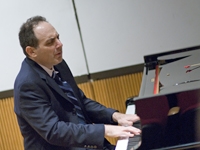
Leonard Bernstein
Leonard Bernstein, who died in 1990 at the age of 72, was one of the greatest musicians and composers America ever produced. An extremely gregarious and energetic man, he was also prone to sweeping bouts of depression and guilt—an emotional contradiction that fueled his illustrious and often troubled career.
That was the posthumous diagnosis offered by Dr. Richard Kogan, clinical instructor in psychiatry and the co-director of the Human Sexuality Program at NewYork-Presbyterian Hospital/Weill Cornell Medical Center, at his recent performance and lecture: "West Side Story at 50: The Mind and Music of Leonard Bernstein," presented as part of the Medical College's Humanities and Medicine program on Sept. 20.
Dr. Kogan, a classically trained pianist who played in a trio with Yo-Yo Ma and Lynn Chang while the three attended Harvard, played a selection of Bernstein's most famous pieces and examined the intersection between the composer's psychology and creative processes.
"He could easily access ecstatic states when he performed," Dr. Kogan said. "That seemed to make him vulnerable to depression as well."

Dr. Richard Kogan
Much of Bernstein's emotional conflict, Dr. Kogan said, stemmed from his grim relationship with his father, Sam Bernstein, who was greatly disappointed in his son's career choice.
Between Bernstein anecdotes and analysis, Dr. Kogan played thrilling renditions of his most renowned works, including "New York, New York" from the musical "On the Town," bits from the symphony "The Age of Anxiety," and a rousing medley of "West Side Story" classics.
Photo of Dr. Kogan by Amelia Panico.
